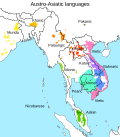The Central Pacific languages, also known as Fijian–Polynesian languages, are a branch of the Oceanic languages spoken in Fiji and Polynesia. Ross et...
2 KB (126 words) - 07:08, 20 January 2024
subdivision of the Pacific Ocean Areas, an Allied military command in World War II Central Pacific languages, a branch of the Oceanic languages This disambiguation...
338 bytes (78 words) - 18:37, 14 July 2012
Polynesian languages form a genealogical group of languages, itself part of the Oceanic branch of the Austronesian family. There are 38 Polynesian languages, representing...
26 KB (2,292 words) - 22:47, 15 November 2024
group of languages. Southeast Solomonic Southern Oceanic linkage (non-Polynesian languages of Vanuatu and New Caledonia) Micronesian Central Pacific (Fijian...
2 KB (113 words) - 03:19, 10 December 2023
Vanuatu languages Loyalties-New Caledonia languages Micronesian languages Central Pacific languages Western Central Pacific linkage Rotuman language Western...
14 KB (1,230 words) - 06:35, 12 October 2024
Proto-Central Pacific (abbreviated as PCP) is the reconstructed ancestor of the Central Pacific languages. It belongs to the Oceanic branch of the Austronesian...
5 KB (303 words) - 21:12, 28 August 2023
Central Pacific languages Eastern Outer Islands languages Loyalty Islands languages Micronesian languages New Caledonian languages North and Central Vanuatu...
2 KB (82 words) - 08:46, 6 November 2020
The Central–Eastern Malayo-Polynesian (CEMP) languages form a proposed branch of the Malayo-Polynesian languages consisting of over 700 languages (Blust...
6 KB (565 words) - 20:07, 7 August 2023
The Central Vanuatu languages form a linkage of Southern Oceanic languages spoken in central Vanuatu. Clark (2009) provides the following classification...
7 KB (241 words) - 19:34, 3 January 2024
Malayo-Polynesian languages are a subgroup of the Austronesian languages, with approximately 385.5 million speakers. The Malayo-Polynesian languages are spoken...
20 KB (1,534 words) - 23:38, 30 October 2024
The Central Philippine languages are the most geographically widespread demonstrated group of languages in the Philippines, being spoken in southern Luzon...
11 KB (836 words) - 23:00, 10 November 2024
original 1971 proposal. The Indo-Pacific proposal, grouping the non-Austronesian languages of New Guinea with certain languages spoken on islands to the east...
32 KB (2,376 words) - 02:02, 6 September 2024
The family of Southeast Solomonic languages forms a branch of the Oceanic languages. It consists of some 26 languages covering the Eastern Solomon Islands...
5 KB (287 words) - 04:28, 6 September 2024
Bay languages (20 languages) Collins, James T. (1983). The Historical Relationships of the Languages of Central Maluku, Indonesia. Canberra: Pacific Linguistics...
3 KB (222 words) - 00:22, 12 July 2024
The Tongic languages are a small group of Polynesian languages, which consists of at least two languages, Tongan and Niuean, and possibly a third, Niuafoʻouan...
975 bytes (31 words) - 21:49, 10 November 2024
both respective native languages and most other languages. In the pre-Islamic and early Islamic eras (c. 1000 and earlier) Central Asia was inhabited predominantly...
141 KB (13,484 words) - 17:01, 9 November 2024
and New Caledonian languages, and perhaps also some Central Vanuatu languages of Ambrym and Efate.: 823–826 Nevertheless, languages in the eastern Solomon...
8 KB (578 words) - 03:14, 10 December 2023
The Central Solomon languages are the four Papuan languages spoken in the state of Solomon Islands. The four languages are, listed from northwest to southeast...
10 KB (817 words) - 09:43, 6 August 2024
official Austronesian languages). By the number of languages they include, Austronesian and Niger–Congo are the two largest language families in the world...
94 KB (7,232 words) - 06:04, 7 November 2024
Colombia to the southeast, the Caribbean to the east, and the Pacific Ocean to the southwest. Central America is usually defined as consisting of seven countries:...
106 KB (7,894 words) - 23:53, 14 November 2024
defines the Arandic group of languages/dialects as comprising 5 Aranda (Arrernte) dialects, plus two distinct languages, Kaytetye (Koch, 2004) and Lower...
35 KB (2,597 words) - 23:21, 14 November 2024
number of daughter languages, successive sequences of vowels came together to produce long vowels and diphthongs, and in some languages these sounds later...
8 KB (334 words) - 10:49, 24 October 2024
East Uvean–Niuafo'ou languages Ellicean languages Futunic languages Pukapuka Samoan Tokelauan Eastern Polynesian Rapa Nui Central Eastern Polynesian Rapa...
3 KB (136 words) - 19:03, 3 January 2024
Athabaskan languages Pacific Coast Athabaskan languages Southern Athabaskan languages or "Apachean" The 32 Northern Athabaskan languages are spoken throughout...
45 KB (4,396 words) - 00:52, 17 November 2024
Proto-Central Pacific language Proto-Polynesian Proto-Admiralty Islands Proto-Temotu language Proto-Micronesian language Proto-Torres–Banks language Proto-Kra–Dai...
5 KB (366 words) - 11:11, 16 September 2024
languages specialist John Lynch (2016) considered the Malakula languages to form a coherent group. One distinctive feature of the Malakula languages is...
11 KB (348 words) - 10:17, 24 June 2024
of the family's languages are spoken by minority groups and have no official status. Ethnologue identifies 168 Austroasiatic languages. These form thirteen...
62 KB (5,897 words) - 10:17, 30 October 2024
languages. According to Jackson (1983, 1986) the languages group as follows: Micronesian family Nauruan Nuclear Micronesian family Kosraean Central Micronesian...
5 KB (412 words) - 22:02, 26 August 2024
the languages of Fiji, i.e. all the Central Pacific languages except Polynesian. all non-Austronesian languages of the region, i.e. Papuan languages (themselves...
4 KB (407 words) - 04:52, 25 May 2024
related to Tagalog and the Bikol languages, all of which are part of the Central Philippine languages. Most Bisayan languages are spoken in the whole Visayas...
26 KB (954 words) - 22:51, 10 November 2024













